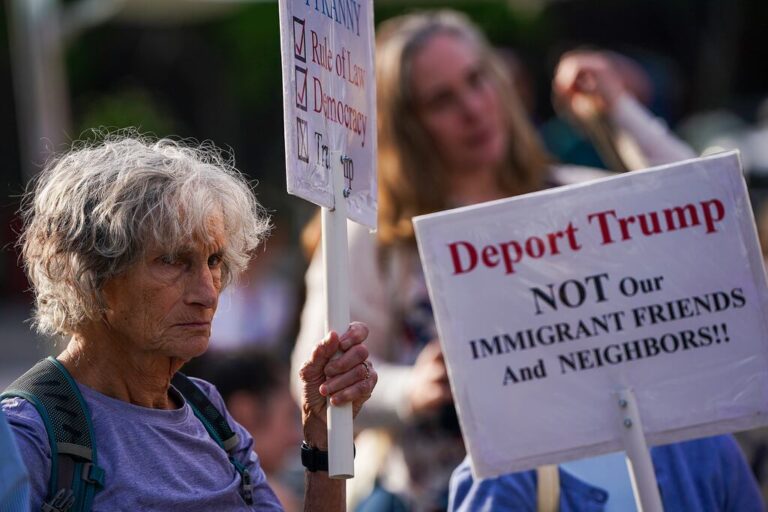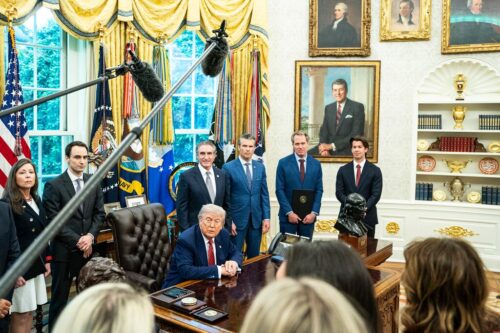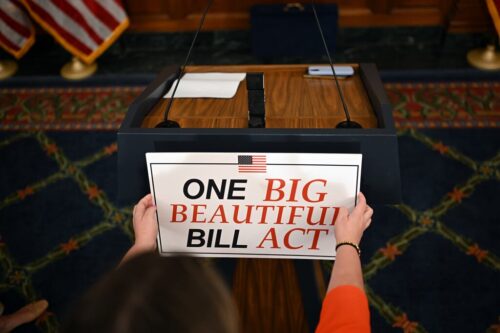This column is from Trendlines, my business newsletter that covers the forces shaping the economy in Boston and beyond. If you’d like to receive it via email on Mondays and Thursdays, sign up here.
In the DC Comics universe, Bizarro World is a place where beauty is despised, ugliness is prized, and it’s a crime to make anything perfect.
Donald Trump’s America has its own Bizarro logic: To Make America Great Again, the president is determined to kneecap the very institutions that made our economy great in the first place.
Among his high-value targets:
- Harvard University, which faces financial catastrophe as the administration slashes billions in federal funding, moves to strip its tax-exempt status, and blocks its ability to admit international students.
- Massachusetts health care providers and medical researchers led by Mass General Brigham, which stand to lose hundreds of millions of dollars in Medicaid revenue and National Institutes of Health grants.
- Apple, which Trump has threatened with a 25 percent tariff on all its imports unless the company moves iPhone manufacturing to the United States.
What binds these institutions? They are engines of innovation, magnets for global talent, and textbook examples of American exceptionalism. Around the world, they are admired. In Trump’s America, they are treated as enemies of the state. He accuses them of antisemitism, racism, hostility to American workers, taxpayer waste, and of course, being “woke.”
It’s McCarthyism redux.
Just listen to Homeland Security Secretary Kristi Noem. “This administration is holding Harvard accountable for fostering violence, antisemitism, and coordinating with the Chinese Communist Party on its campus,” she said last week as she effectively pulled the plug on foreign students attending Harvard.
Trump World is particularly inhospitable to a Massachusetts economy built on an interconnected web of colleges, hospitals, and biotechs, with emerging artificial intelligence and climate tech sectors.
Harvard is an indispensable part of that network, and “destroying Harvard, even if the campaign against intellectualism stopped there — which it wouldn’t — would be like pulling a crucial piece out of a Jenga tower,” economist Paul Krugman wrote on Substack on Monday. “The odds are that the whole structure of the Greater Boston education and innovation ecosystem would collapse.”
Is Krugman’s prediction of collapse too dire? I won’t argue with a Nobel laureate. But even a hobbled Harvard would be a blow to the local economy.
And that doesn’t include the potential pain from tariffs and immigration restrictions. If Trump’s policy suite triggers even a mild recession, Massachusetts could lose nearly 100,000 jobs, according to a recent report by Boston University finance professor Mark Williams.
“We’re very early in. Things are very bad, and they are going to get worse,” said Yvonne Hao, who recently stepped down as the state’s secretary for economic development.
Of course, these institutions aren’t perfect.
Apple could make more products here. The medical research world has its own issues with bureaucracy and transparency. And Harvard mishandled the protests over the Israel-Hamas war and didn’t act quickly enough to squelch behavior that made Jewish students feel unsafe and unwelcome.
But what’s happening now isn’t reform. It’s retribution.
Even Steven Pinker, a Harvard professor and longtime critic of his employer, says Trump is going too far.
“Harvard is an intricate system that developed over centuries and constantly has to grapple with competing and unexpected challenges. The appropriate treatment (as with other imperfect institutions) is to diagnose which parts need which remedies, not to cut its carotid and watch it bleed out,” he wrote in a recent New York Times opinion essay.
I’m not too worried about Apple. Chief executive Tim Cook will promise enough domestic manufacturing and investment — beyond the $500 billion in four years he’s already pledged — to allow Trump to back down from Apple-specific tariffs while claiming victory. With more than $48 billion in cash and short-term investments, the company can afford to play the long game.
Harvard has a $53 billion endowment, but much of the money is tied up in investments and roughly 80 percent is restricted by donors for specific purposes, such as scholarships or named teaching positions.
President Alan Garber has no choice but to fight the administration in court.
In two cases filed in federal court in Boston, Harvard’s lawyers argue the administration has violated federal laws and the Constitution. As the Globe’s Mike Damiano and Hilary Burns have reported, many lawyers, including some conservatives who share Trump’s critiques of universities, agree some of the administration’s tactics appear to be illegal.
Meanwhile, 22 states, including Massachusetts, have sued to repeal the NIH funding cuts.
At a time when geopolitical rivals are racing to dominate tech, medicine, and higher education, trying to eviscerate our own champions is a Bizarro twist on economic policy.
But populism thrives on grievance, not achievement. It doesn’t matter if the institution under attack is saving lives or revolutionizing the smartphone.
For Trump, it’s all about getting powerful institutions under his thumb — even at the risk of tanking the economy he vowed to make great again.
Trump administration says Harvard funding cuts are punishment for ‘race discrimination’Lawyers question legality of Trump’s Harvard campaign79,000 lost jobs. $13 billion in GDP gone. Study tallies potential hit to Mass. from Trump’s ‘economic attack.’




Comment count: